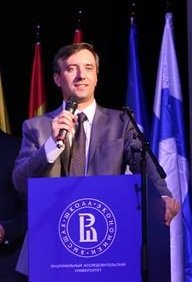The development of International Regional Studies (IRS) as a self-sufficient academic track is a lengthy, gradual and complex process. Training a highly-qualified specialist capable of resolving challenging tasks responds to the prospective plans of Russia\'s practical organizations, including companies, mass-media or government agencies, and needs effective instruments. The key factors of success include the interdisciplinary approach to practical tasks, their quick solutions premised upon practically-oriented competences and the scale effect. This increases the relevance of fundamental and applied competences and the expansion of professional networking.
In this regard, of special interest are professional associations which integrate both academic researchers and practitioners of many specialties. The aim of these venues is in congruence with the concept of the IRS specialist who must be competent in different areas: the economy, policy, legal systems of the specialization countries, the specificity of doing business and public events there etc. Sometimes, the IRS specialist may need information on narrow-focused issues, for instance, the specificity of corporate lobbying organizations, practical aspects of drafting arbitration agreements or implementing interim measures in international commercial arbitration while settling commercial disputes in which companies from countries and regions of their specialization participate. For IRS specialists, professional associations facilitate the task to seek and find necessary information using the advantages of networking.
Professional associations are helpful in not only resolving on-going problems in the “here-and-now” format by means of professional networks. This is just one among many functions which such venues perform. What is much more important is the cumulative positive effect of their activity, which is seen along the educational, academic and administrative tracks.
With respect to the educational track, one of the indisputable advantages of professional associations accounts for an exponential increase of possibilities to carry out international student projects. As an important task of associations is to maintain the continuity between generations of researchers and the academic mentorship, eminent professors not only agree to head such projects, but often initiate them. As a rule, leading experts from many countries are members of academic councils of several professional associations, because of which students who participate in these projects can practise their skills at the top level. With the support provided by professional associations, an international expert commission for the project expertise and the eventual defense can be organized. The fact that students can develop proficiency under the academic supervision of leading world specialists in the field, simultaneously upgrading their soft skills in the international milieu amidst the on-going COVID-19 pandemic, makes professional associations a valuable educational instrument.
Apart from providing venues for relatively long-term projects which are carried out mostly during the on-going academic year, professional associations are helpful in organizing short-term or even one-time events: on-line master classes, creative workshops etc. As a consequence, heads of educational programs can not only monitor, but also actively participate in shaping the best practices in IRS training. The latter are exemplified by educational programs in the formats of “Bachelor Plus” and “Master Plus”, which include internships and practices of all sorts in professional associations, as well as on-line re-training and career development courses, corporate universities etc., performed or at least assisted by professional associations. A likely outcome is the establishment of alliances between educational programs, research laboratories, university chairs and departments, and eventually, network universities based upon and supported by professional associations.
No less importantly, these venues may be beneficial to pre-university education. Since many school graduates have a faint idea of their future career, professional guidance with an emphasis upon differences between specialists in regional studies, oriental studies, international relations, economics and political science, as well as integrating the brightest school graduates in student projects (with due consideration that this selection should be very careful) is an important priority for the community of IRS specialists.
The academic feedback is also positive. As a rule, professional associations publish conference proceedings, expert comments and academic journals. But most importantly, professional associations have connections with similar foreign venues. This allows specialists to keep abreast of on-going professional discussions in their areas of research. Since the websites of associations are often aggregators of news and analytical materials, while professional cross-partnerships of all sorts are increasing in popularity, subscriptions to these materials becomes a valuable channel of obtaining information, the high quality of which is guaranteed and does not need verifying.
IRS specialists may simultaneously participate in several professional associations. For instance, Professor D.Mosyakov, Professor V.Kolotov and Professor E.Kanaev are members of the Russian National Committee of the Council for Security Cooperation in Asia Pacific, the All-Russian Association of the South Pacific Researchers and the expert pool of ASEAN Center in MGIMO University, Ministry of the Foreign Affairs of the Russian Federation. Alternatively, an expert may be a notable figure in both business structures and IRS associations. This is exemplified by the case of S.Mikhnevich who is simultaneously Director of the RSPP Center for Multilateral Cooperation and a member of the Academic and Expert Council of the All-Russian Association of the South Pacific Researchers. This cross-participation allows specialists to synergize their competences in the regions of their specialization with substantive issues in practically-oriented areas.
The administrative and social aspects of contribution made by professional associations in training of highly-qualified IRS specialists are also important. Since influential figures from government agencies, mass-media or big companies are members of professional associations, IRS specialists can better understand expectations of practitioners. As a result, foundations for the long-term partnership between the state, business and experts is laid and eventually developed.
Finally, students, especially seniors, attach profound significance to their career prospects after graduation. In this regard, professional associations are also relevant. For university professors, being members of such organizations and participating in their managing bodies, is an appreciation of their high professional performance and excellence. As for university graduates, cooperation with leading experts in the field can be an entry point to the professional community.
The factors outlined above suggest that professional associations offer their participants perfect opportunities. Nevertheless, the problems are also serious. The most important are specified below.
The other side of the transparency of professional associations is the presence of “come-and-go” people. The absence of formal barriers to join the professional community may potentially attract unscrupulous and incompetent people, as well as allows them to shelter behind the authority of associations while, for instance, commenting on the on-going events or making the project expertise.
Many professional associations discuss drafts of articles prepared by their experts without making these materials public. As a rule, the key ideas are collectively discussed. Regrettably, cases of dishonest misuse cannot be excluded. Bright ideas are a valuable asset, and to transform them so as to maintain the substance, but changing the form is relatively easy. After an article premised upon such an idea is published, to prove the case of the dishonest misuse is nearly impossible.
Lastly but very importantly, the research and public activity of IRS communities cannot be isolated from political factors. Implications may vary from fake news to disruptive influence upon relations between specialists from different countries.
In sum, high-level and comprehensive training of new generations of IRS specialists requires not only developing relevant educational programs, upgrading teaching methods of various disciplines and the IRS methodology, but also forming the necessary external milieu. The letter should contribute to the seamless training of area studies specialists, specifically, along the vertical (high school - bachelor program - master program - doctoral school) and the horizontal (education - research - practice) tracks.
The underlying aim is to establish highly-competitive Russian IRS scholarly traditions, which will strengthen Russia\'s international image, and to analytically support the projects the Russian Federation carries out in various regions. Arguably, Russian IRS specialists should make considerable effort in order to translate these plans into reality, in which professional associations will play a crucial role.




Комментарии
Добавить комментарий